Reading: Toward a New Millennium
Toward a New Millennium
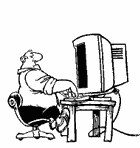
The last decade of the 20th century was marked with dizzying change for the United States. With the Soviet Union out of the picture, American diplomats sought to create a "NEW WORLD ORDER" based on democracy, free-market capitalism and the Western lifestyle.
Challenges from abroad did not disappear with the end of the Cold War. The invasion of Kuwait by Saddam Hussein's Iraq threatened a major percentage of the world's oil reserves. In the largest American military operation since the Vietnam War, the United States led a multinational force in the liberation of Kuwait.
The collapse of the Cold War in Yugoslavia allowed centuries of hatred between rival ethnic groups to bubble to the surface. The term "ETHNIC CLEANSING"was applied to the process of removing an entire nationality out of a particular territory by threats, violence, or genocide. The United States contributed blue-helmet peacekeeping troops to Bosnia to end ethnic cleansing and committed air support to Kosovar Albanians who faced the same fate.
American troops were used to provide food to starving civilians in war-tornSOMALIA, to restore a democratically elected president to HAITI, and to bomb suspected terrorist bases in SUDAN and Afghanistan.
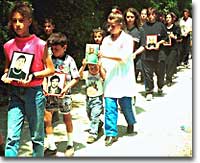
Carrying portraits of the dead through the streets, young villagers mourn the massacre of 41 ethnic Albanians in the village of Cuska, Kosovo by Serbian security forces.
Americans began to think of themselves as peacekeepers of the world.
As both parties moved to the center to claim the largest numbers of American voters, bitter partisanship emerged. Voters punished the Republicans by voting against GEORGE BUSH in 1992. After two years of Bill Clinton, voters punished him by turning the House and the Senate over to the Republicans. A bitter partisan struggle emerged over the personal sexual improprieties of Clinton in 1998, leading to an impeachment vote largely along party lines. Although disgusted with Clinton's behavior, voters punished overzealous Republicans by trimming their majority in Congress in 1998.
The 1990s marked a revolution in communications. Individual use of the Internet mushroomed from a handful of scientists and professors at the beginning of the decade to becoming widespread by the year 2000. Companies regeared their approaches for online commerce. Electronic mail was a common new form of communications between relatives, friends, and colleagues. Satellite dish networks challenged cable companies for business in telecommunications.
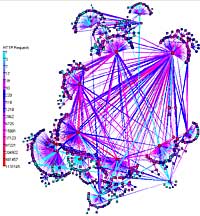
Although many efforts have been made to illustrate the World Wide Web, the so-called "Information Revolution" is so new and has evolved so rapidly, the illustrations usually convey only complexity and chaos.
The United States entered the 21st century as the leading users of Internet and satellite technology. These devices opened new windows of opportunity to spread American culture across the globe. Vietnamese in Hanoi were wearing Tommy Hilfiger shirts, Russians were downing Big Macs in Moscow, and Nike sneakers were being made in sweatshops around the world. American products and culture were being spread around faster than a computer virus.
The 20th century had been dubbed by many as "THE AMERICAN CENTURY." Would the 21st Century also be an American century? Or will the United States be eclipsed by new superpowers like China or the EUROPEAN UNION? Only time will reveal the answers.
Operation Desert Storm
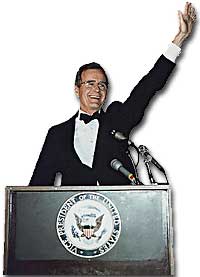
In the 1988 election, George Bush and his running mate. Dan Quayle, won 54% of the popular vote and 426 of the 538 electoral votes, soundly beating Democrat Michael Dukakis.
The first major foreign crisis for the United States after the end of the Cold War presented itself in August 1990. Saddam Hussein, the dictator of Iraq, ordered his army across the border into tiny Kuwait. This was no ordinary act of aggression. Iraq's army was well equipped. The United States had provided massive military aid to Iraq during their eight-year war with Iran, giving them the fourth largest army in the world.
Kuwait was a major supplier of oil to the United States. The Iraqi takeover posed an immediate threat to neighboring Saudi Arabia, another major exporter of oil. If Saudi Arabia fell to Saddam, Iraq would control one-fifth of the world's oil supply. All eyes were on the White House, waiting for a response. President Bush, who succeeded President Reagan, stated simply: "This will not stand."
In the last months of 1990, the United States participated in the defense of Saudi Arabia in a deployment known as Operation Desert Shield. Over 500,000 American troops were placed in Saudi Arabia in case of an Iraqi attack on the Saudis. The U.S. further sought multilateral support in the United Nations Security Council. Traditionally, Iraq was an ally of the Soviet Union, who held a veto power over any potential UN military action. Looking westward for support for their dramatic internal changes, the USSR did not block the American plan. The UN condemned Iraq and helped form a coalition to fight Saddam militarily.
Bush, remembering the lessons of Vietnam, sought public support as well. Although there were scant opponents of the conflict, the vast majority of Americans and a narrow majority of the Congress supported the President's actions. When all the forces were in place, the United States issued an ultimatum to Saddam Hussein: leave Kuwait by January 15,1991 or face a full attack by the multinational force.
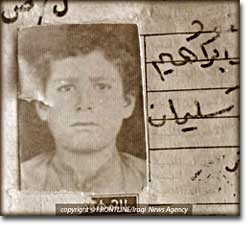
Saddam Hussein grew up in a poor family. As a boy he was forced to steal eggs and chickens so the family could eat. In his late childhood he became a gun man for the Ba'ath Party and was involved in an assassination attempt on a military leader in Iraq.
January 15 came and went with no response from the Iraqis. The next night Desert Shield became Desert Storm. Bombing sorties pummeled Iraq's military targets for the next several weeks. On many days there were over 2500 such missions. Iraq responded by launching Scud missiles at American military barracks in Saudi Arabia and Israel. Attacking Israel was a stratagem to persuade all the neighboring Arab nations to join the Iraqi cause. After intense diplomatic pressure and negotiation, the Arab nations remained in opposition to Iraq.
On February 24, the ground war began. Although the bombing lasted for weeks, American ground troops declared Kuwait liberated just 100 hours after the ground attack was initiated. American foot soldiers moved through Kuwait and entered southern Iraq. This posed a dilemma for the United States. The military objectives were complete, but Saddam, the perpetrator of the rape of Kuwait, was still ruling Iraq from Baghdad. President Bush feared that the allies would not support the occupation of Baghdad. Concerns were raised that if Saddam's regime were toppled, the entire nation could disintegrate into a civil war. Soon Iraq agreed to terms for a ceasefire, and the conflict subsided.
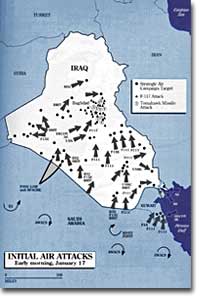
This map shows the initial air attacks of Desert Storm made by the allied forces early in the morning on January 17, 1991.
Iraq did not leave Kuwait untouched. Millions of dollars of valuables were plundered by the occupying troops. As Iraq retreated, they detonated explosives at many of Kuwait's oil wells. The disaster to the environment grew as Iraq dumped oil into the Persian Gulf. The costs were enormous, and casualty figure staggering. Although estimates range in the hundreds of thousands of Iraqi deaths, only 148 Americans were killed in the battle. This was primarily because of the technological advances of the United States.
The Persian Gulf War was a television event. CNN broadcast round-the-clock coverage of unfolding events. Americans saw footage from cameras placed on smart bombs as they struck Iraqi targets. The stealth fighter, designed to avoid radar detection was put into use for the first time. General Norman Schwarzkopf and General Colin Powell became household names as citizens watched their direction of the conflict.
The United States passed its first test of the post-Cold War world. Skillful diplomacy proved that the United Nations could be used as an instrument of force when necessary. Although Moscow did not contribute troops to the operation, they gave tacit approval for the attack. The potential for multinational cooperation was demonstrated. The largest American military operation since Vietnam was completed with smashing success. Most Americans felt confident in their military and technological edge once more. President Bush promptly declared that the "new world order had begun."
A Baby Boomer in the White House
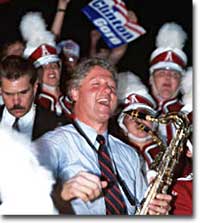
Despite allegations of smoking marijuana, having extramarital affairs, and dodging the draft, Bill Clinton came out of his 1992 Presidential campaign victorious.
Popularity is fleeting.
President Bush enjoyed an approval rating in March 1991 of 91 percent for his handling of Operation Desert Storm. As the Presidential race for 1992 began to unfold, many potential candidates were scared to challenge him and look to 1996 as a better opportunity. But the recession that battered the American economy would not go away. As growth remained low and unemployment persisted, some of the shine began to wear off the President. Not since JAMES MONROE'S
second term in 1820 had a sitting President been re-elected during an economic slump.
Enter Bill Clinton.
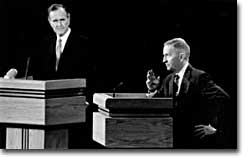
In the October, 1992 Presidential debate at Michigan State University, Ross Perot charmed America with his no-nonsense wit: "I love the fact that people will listen to a guy with a bad accent and a poor presentation manner talking about flip charts for 30 minutes, because they want the details. See, all the folks up there at the top said the attention span of the American people is no more than five minutes, they won't watch it. They're thirsty for it."
The two candidates could hardly have been more different. Bush was a hero of World War II and had extensive Washington experience, including heading the CIA, Ambassador to the United Nations, and eight years as Vice-President.
Clinton was born after World War II and did not fight in Vietnam, so he faced constant charges of dodging the draft. He had no experience on the federal level of government; he simply was the popular governor of Arkansas. Throughout the campaign, scandal after scandal hit Clinton. Charges of adultery were addressed on television. When accused of smoking marijuana in the 1960s, Clinton confessed — but added that he did not inhale. Rumors of a real estate scandal called WHITEWATER surfaced from time to time. Clinton was no "Teflon" candidate. Everything stuck to him, but none of it mattered in the end.
His campaign adviser posted a sign over his desk that read simply: "IT'S THE ECONOMY, STUPID." With a charismatic smile and a gentle, sincere voice, Clinton hammered away at the recession, and promised new ideas and a break with twelve years of Republicans in the White House.
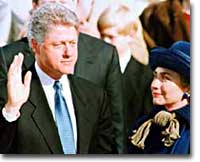
Bill Clinton was the first President since Richard Nixon to win the White House with less than 50% of the popular vote.
Additional problems beset President Bush in 1992. In April, the city of Los Angeles erupted into a five day looting and burning rampage that killed more than 50 people and claimed damages nearing $1 billion. The riot was touched off by the acquittal of five Los Angeles police officers for the beating of Rodney King during his arrest in 1991. A hidden camera showed the officers repeatedly beating King with nightsticks while he lay on the ground. Despite the video evidence, the jury found the police officers not guilty of using excessive force. The announcement of the verdict released years of pent-up rage many African Americans felt about the ongoing problem of police brutality.
Bush faced a challenge for his own party's nomination by PATRICK BUCHANAN, a journalist and former Nixon aide. Buchanan voiced concern about immigration, free trade, abortion, and appealed to the social conservatives in the Republican Party. Although the President defeated Buchanan handily in the primaries, he was forced to spend resources in the effort.
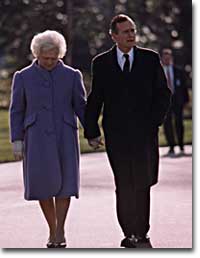
President George Bush and First Lady Barbara Bush on their last day at the White House.
The most successful third party candidate since 1912 emerged in the form of ROSS PEROT, a Texas billionaire. Perot brought the problem of the nation's growing national debt to the campaign. Millions watched his self-funded 30-minute primetime campaign commercials that attacked both Republicans and Democrats for reckless spending and immense deficits.
Election Day belonged to Bill Clinton. Although he garnered only 43% of the popular vote, he beat President Bush handily in the electoral tally. Bush earned 38% of the vote, and Perot reached an impressive 19% of American voters. Much of Clinton's support came from baby boomers. Clinton's victory marked an end to the domination of politics by the World War II generation. Americans who had come of age during the turbulent sixties and seventies now had a representative in the White House.
Republicans vs. Democrats
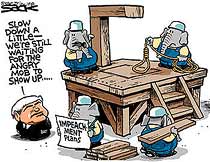
Cartoonist Steve Sack satirized Newt Gingrich's thirst for popular approval of his impeachment plans in theMinneapolis Star-Tribune.
It seemed like Bill Clinton had everything going for him. He defeated an incumbent President and became the first Democrat to win the White House since Jimmy Carter defeated Gerald Ford. He had a Democratic House and a Democratic Senate to work with him.
One of the first major initiatives he began was health care reform. Many Americans were concerned about spiraling medical costs. Medicare did not cover prescription drugs and only paid a portion of health care costs. Over 20 million Americans had no HEALTH INSURANCE whatsoever. Clinton assembled a task force to study the problem and assigned his wife HILLARY to head the committee. She became the most politically active first lady since Eleanor Roosevelt.
Eventually Clinton presented a plan to limit costs and insure each American citizen to the Congress. Powerful interest groups representing doctors and insurance companies opposed Clinton. Many in the Congress thought the program too costly. Conservatives compared the plan to socialized medicine. Despite a "friendly" Democratic Congress, the Clintons' proposal was defeated.
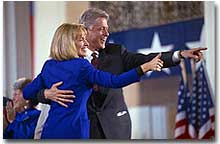
Hillary Clinton's stoic stand-by-her-man attitude during the mounting drama of the Clinton-Lewinsky scandal proved a factor in her husband's popular support throughout the ordeal.
When the midterm Congressional elections took place in 1994, the Republicans thought they had a chance to capture at least one house. Led by Representative NEWT GINGRICH, Republicans in the Congress signed a Contract with America. The contract was simply a list of ten promises each signatory pledged to pursue if the Republicans won. The stratagem worked brilliantly. The Senate votes narrowly awarded a Republican majority. More astonishing were the results in the House.
The Democrats had controlled the House of Representatives since 1954. Many Republicans had gotten used to acting like an opposition party. When the votes were counted, Republicans outscored Democrats in House seats 230-205. Gingrich was rewarded for his efforts by being named Speaker of the House.
But Bill Clinton was a political survivor. Even though voter turnout was low, Clinton accepted the Republican victory and pledged to work with the House leadership. Gingrich and his cohorts took a tough stand with the President. Unless Clinton agreed to accept deep cuts in social spending programs in 1995, they threatened to shut down the government and appropriate no funds. It was a classic standoff — Clinton versus Gingrich.
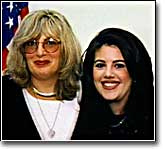
Linda Tripp and Monica Lewinsky were the center targets of the media storm that raged during the events leading up to President Clinton's impeachment.
When neither party would blink, a partial shutdown of government services took place. The American public often decides the victors of such battles. Polls showed strong support for the President. Many Americans saw the Gingrich Republicans as mean-spirited zealots who wanted to end funds for school lunches. Clinton slowly saw his approval ratings rise. By the time he ran for a second term in 1996, the economy was booming and the huge budget deficit had been controlled. Voters rewarded Clinton by re-electing him over the Republican candidateROBERT DOLE.
In January 1998, a scandal that nearly ended Clinton's Presidency unfolded in the press. It was reported that Clinton engaged in a sexual relationship with a White House intern named MONICA LEWINSKY during his first term. Although Clinton originally denied the charges, overwhelming evidence was presented that Clinton and Lewinsky engaged in repeated sexual contact, even in the Oval Office.
Republicans were outraged. An independent counsel named KENNETH STARRwas appointed to gather evidence against Clinton. As the summer ended, Clinton admitted that many of the reports were true and that he was ashamed of his behavior. The House Judiciary Committee drew up articles of impeachment on four counts including abuse of power and obstruction of justice. Across the nation, Americans debated whether or not Clinton's misbehavior constituted an impeachable offense.
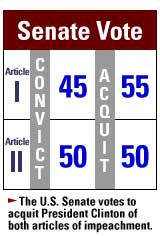
During President Clinton's Impeachment trial, the Senate rejected Article I that dealt with whether the President perjured himself before the Grand Jury, and split evenly on Article II, Clinton's alleged obstruction of justice.
The House decided that two articles of impeachment were in order, and in December 1998, Clinton joined Andrew Johnson as the only Presidents to be impeached. In such proceedings, the Senate has the final word and acts as a judge and jury. Two-thirds of the Senators must vote guilty to remove a President from office. Clinton survived this final vote to impeach which unfolded along party lines.
As the year 2000 approached, partisan politics were as toxic as ever. Republicans claimed that they fixed the economy and Clinton got the credit. Regardless of who gets the credit or blame, the 1990s were a decade of very steady economic growth. The crippling budget deficits of the 1980s were finally brought under control, and Americans enjoyed low inflation, low unemployment, low interest rates and a booming stock market. Even the bad blood between the two parties could not change that.
Living in the Information Age
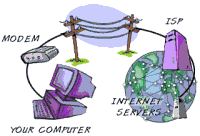
Here is an illustration from the days of modem-connectivity to the web.
Some have begun to call it the Information Revolution. Technological changes brought dramatic new options to Americans living in the 1990s. From the beginning of the decade until the end, new forms of entertainment, commerce, research, work, and communication became commonplace in the United States. The driving force behind much of this change was an innovation popularly known as the Internet.
Personal computers had become widespread by the end of the 1980s. Also available was the ability to connect these computers over local or even national networks. Through a device called a modem, individual users could link their computer to a wealth of information using conventional phone lines. What lay beyond the individual computer was a vast domain of information known as cyberspace.
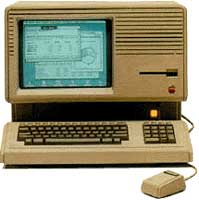
Upon its release in 1983 the Apple "Lisa" computer — named for one of its developers daughters — was supposed to revolutionize personal computing. But interest in "Lisa" was minimal due to its nearly $10,000 price tag and the introduction of the much more affordable "Macintosh" a year later.
The INTERNET was developed during the 1970s by the Department of Defense. In the case of an attack, military advisers suggested the advantage of being able to operate one computer from another terminal. In the early days, the Internet was used mainly by scientists to communicate with other scientists. The Internet remained under government control until 1984.
One early problem faced by Internet users was speed. Phone lines could only transmit information at a limited rate. The development of FIBER-OPTIC cables allowed for billions of bits of information to be received every minute. Companies likeINTEL developed faster microprocessors, so personal computers could process the incoming signals at a more rapid rate.
In the early 1990s, the WORLD WIDE WEB was developed, in large part, for commercial purposes. Corporations created home pages where they could place text and graphics to sell products. Soon airline tickets, hotel reservations, books, and even cars and homes could be purchased online. Colleges and universities posted research data on the Internet, so students could find valuable information without leaving their dormitories. Companies soon discovered that work could be done at home and submitted online, so a whole new class of telecommuters began to earn a living from home offices unshaven and wearing pajamas.
New forms of communication were introduced. ELECTRONIC MAIL, or EMAIL, was a convenient way to send a message to associates or friends. Messages could be sent and received at the convenience of the individual. A letter that took several days to arrive could be read in minutes. Internet service providers like America Online and CompuServe set up electronic chat rooms. These were open areas of cyberspace where interested parties could join in a conversation with perfect strangers.
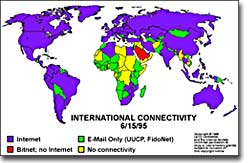
This map shows just how "wired" the world had become as of mid-1995.
Advocates of the Internet cited its many advantages. The commercial possibilities were limitless. Convenience was greatly improved. Chat rooms and email allowed individuals to converse who may never have had the opportunity in the past. Educational opportunities were greatly enhanced because of the wealth of knowledge now placed at the fingertips of any wired individual. "SURFING THE 'NET" became a pastime in and of itself.
Critics charged that the Internet created a technological divide that increased the gap between the haves and have-nots. Those who could not afford a computer or a monthly access fee were denied these possibilities. Many decried the impersonal nature of electronic communication compared to a telephone call or a handwritten letter. Hate groups were using the Internet to expand their bases and recruit new members. The unregulated nature of the Internet allowed pornography to be broadcast to millions of homes. Protecting children from these influences, or even from meeting violent predators would prove to be difficult.
Regardless of its drawbacks, by the end of the 1990s, the world was fast becoming wired.
The End of the American Century
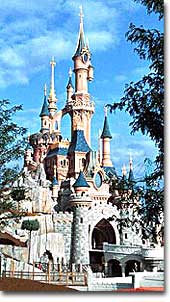
Disneyland Paris was the object of intense resistance by French citizens who feared U.S. cultural influence would undermine French traditions. Despite these concerns, the park still manages to draw over 10 million visitors each year.
In 1900, the United States was an emerging giant. In the midst of its second industrial revolution, America had just begun to acquire an overseas empire and international influence.
During the first half of the 20th century, the United States proved to be the decisive combatant in two major world wars, earning the right to determine a post war outcome. The Cold War that plagued the world in the last half of the 20th century proved in the end to be an American victory as well.
American scientists had developed nuclear technology, the computer, put human beings on the moon, and were at the vanguard ofIMMUNIZATION techniques.
America's postwar economy was the envy of the globe. A consumer-driven middle class built the highest standard of living in the world. American popular culture was everywhere. Levi's jeans, Coca-Cola, McDonald's, and Hollywood movies were enjoyed around the world.
When the Soviet Union collapsed in 1991, the United States was the only remaining military superpower, and the world looked to Washington for leadership at combating aggression in the Persian Gulf, ending ethnic cleansing in places such as Kosovo, and halting nuclear proliferation.
The NORTH AMERICAN FREE TRADE AGREEMENT (NAFTA) ended economic barriers with Canada and Mexico and promised even more prosperity.
Why then did so many Americans feel uneasiness and uncertainty as the 21st century approached? Economic challenges were created by the prosperous Pacific Rim and a stronger European Union. Despite prosperity, real incomes stagnated for the bottom half of American wage earners. Although legal barriers to equality were largely eliminated for American minority groups, economic equality was but a dream. Women made advances toward equity, but still earned less than 75 cents for every dollar earned by American males. Many Americans felt they were working longer hours for less.
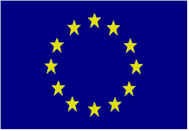
The European Union, whose flag is seen above, is an organization of 15 European countries working together to manage political and economic cooperation. From 1999 to 2002, member nations will be adopting the "Euro" as the new, single currency of Europe.
Pessimists depicted America as a civilization in decline. The rise of the divorce rate led to many children being raised in broken homes. Gun violence was a major problem.SCHOOL SHOOTINGS became commonplace. When two students entered COLUMBINE HIGH SCHOOL in Littleton, Colorado in April 1999 with weapons, they murdered thirteen people before taking their own lives. Critics pointed to a media that glorified and promoted violence, permissive gun laws, failing schools, and neglectful parenting.
Environmentalists observed the ominous dwindling of rainforests and global warming trends. Disasters such as the EXXON VALDEZ oil spill of 1989 and rising gasoline prices in 2000 illustrated America's embarrassing dependency on fossil fuels and the ecological and economic havoc that resulted.
Will the 21st century also be an American century? Or will the United States be eclipsed by new superpowers like China or the EUROPEAN UNION? Only time will reveal the answers.
In the meanwhile, the United States will rely on its history of increasing democracy and respect for human rights, its dynamic diversity, and the innovative character of its people to seek new solutions to whatever problems may arise.
